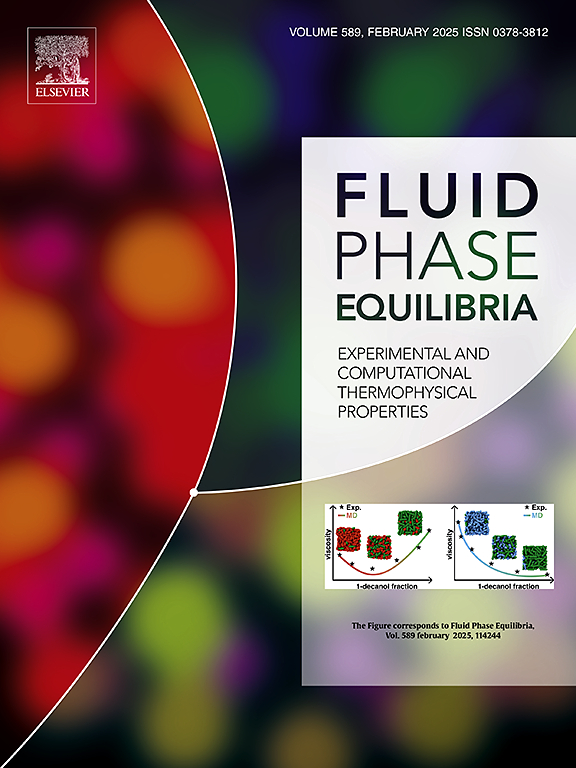Speed-of-sound measurements in liquid n-heptane and 2,2,4-trimethylpentane (isooctane)
IF 2.7
3区 工程技术
Q3 CHEMISTRY, PHYSICAL
引用次数: 0
Abstract
This paper reports comprehensive and accurate measurements of the speed of sound in liquid n-heptane and 2,2,4-trimethylpentane (isooctane). The measurements were carried out by a double-path-length pulse-echo technique and cover the temperature range between 200 K and 420 K with pressures up to 100 MPa. The expanded uncertainties (coverage factor ) amount to 2.1 mK in temperature, 0.005% in pressure, 0.02% in speed of sound in -heptane, and 0.015% in speed of sound in isooctane, with the exception of a few state points at low pressures, where it increases up to 0.03% for -heptane and up to 0.035% for isooctane. Our data are more accurate than previously published data for both fluids. The measurements for isooctane extend the range in which the speed of sound had been measured before from 293 K down to 200 K and from 373 K up to 420 K. We also provide accurate correlations for the speed of sound as a function of temperature and pressure in the range of our measurements. Our data can contribute to developing new, more accurate equations of state for both fluids.
液体正庚烷和2,2,4-三甲基戊烷(异辛烷)的声速测量
本文报道了液体正庚烷和2,2,4-三甲基戊烷(异辛烷)中声速的全面而精确的测量。测量采用双路脉冲回波技术,温度范围在200 K到420 K之间,压力高达100 MPa。扩展不确定度(覆盖系数k=2)在温度下为2.1 mK,在压力下为0.005%,在正庚烷声速下为0.02%,在异辛烷声速下为0.015%,但在低压下的几个状态点除外,正庚烷的不确定度增加到0.03%,异辛烷的不确定度增加到0.035%。我们的数据比以前发表的两种流体的数据更准确。异辛烷的测量扩展了以前测量声速的范围,从293 K下降到200 K,从373 K上升到420 K。在我们的测量范围内,我们还提供了声速作为温度和压力函数的精确相关性。我们的数据有助于为这两种流体建立新的、更精确的状态方程。
本文章由计算机程序翻译,如有差异,请以英文原文为准。
求助全文
约1分钟内获得全文
求助全文
来源期刊

Fluid Phase Equilibria
工程技术-工程:化工
CiteScore
5.30
自引率
15.40%
发文量
223
审稿时长
53 days
期刊介绍:
Fluid Phase Equilibria publishes high-quality papers dealing with experimental, theoretical, and applied research related to equilibrium and transport properties of fluids, solids, and interfaces. Subjects of interest include physical/phase and chemical equilibria; equilibrium and nonequilibrium thermophysical properties; fundamental thermodynamic relations; and stability. The systems central to the journal include pure substances and mixtures of organic and inorganic materials, including polymers, biochemicals, and surfactants with sufficient characterization of composition and purity for the results to be reproduced. Alloys are of interest only when thermodynamic studies are included, purely material studies will not be considered. In all cases, authors are expected to provide physical or chemical interpretations of the results.
Experimental research can include measurements under all conditions of temperature, pressure, and composition, including critical and supercritical. Measurements are to be associated with systems and conditions of fundamental or applied interest, and may not be only a collection of routine data, such as physical property or solubility measurements at limited pressures and temperatures close to ambient, or surfactant studies focussed strictly on micellisation or micelle structure. Papers reporting common data must be accompanied by new physical insights and/or contemporary or new theory or techniques.
 求助内容:
求助内容: 应助结果提醒方式:
应助结果提醒方式:


